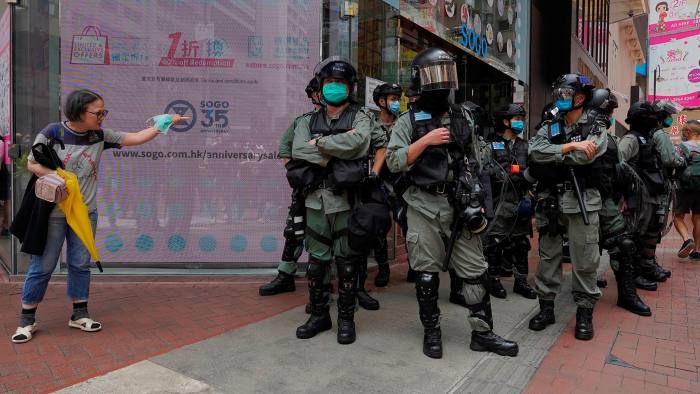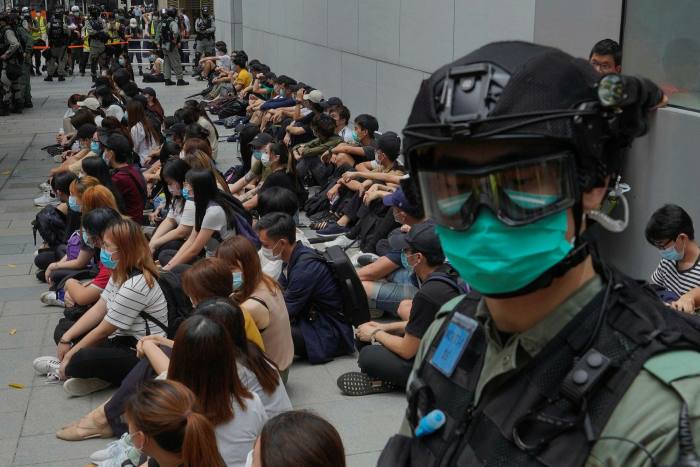
Hong Kong police arrest hundreds and fire pepper balls at protesters
Scores stopped and searched as lawmakers debate proposed law on Chinese national anthem
by Sue-Lin Wong, Joe Leahy, Nicolle LiuRiot police fired pepper balls in Hong Kong’s central business district on Wednesday as hundreds of protesters gathered to oppose the reading of a contentious law on China’s national anthem in the city’s de facto parliament.
Demonstrators chanted “Hong Kong independence, the only way out!” and taunted police as officers pursued them through lunchtime crowds and past luxury shops.
Police said they had arrested hundreds of people for illegal assembly in the business and shopping districts by mid-afternoon.
The tensions in the city followed threats by the US to sanction China and Hong Kong over a separate move by Beijing to impose a national security law on the territory.
The National People’s Congress, China’s rubber-stamp parliament meeting in Beijing this week, is expected to pass a motion to begin drafting the security law on Thursday.
Police stopped and searched suspected protesters and detained scores in the streets around the city’s Legislative Council and the central business district, as lawmakers began debating the China national anthem bill. The proposed law would allow up to three years’ imprisonment for people who were deemed to insult the “March of the Volunteers”.
Popular social media channels used for organising pro-democracy rallies noted the “unprecedented deployment of police” and urged protesters to be cautious.
“It’s not just about the national anthem law, it’s about the national security law too,” said one protester, who identified herself as Luis.
Protesters threw dustbins on to roads to block traffic before being chased away by riot police.
Two expatriates who were passing through the tumult expressed support for the police. “I hope they get all those little black hooligans,” said one British businessman, referring to the colour of clothing typically worn by more radical protesters.
Alan, a 33-year-old finance worker in office attire, was seized by police and pushed aggressively against a wall. He was told he would be arrested if he kept yelling slogans against the police.
Asked if he was worried about what might happen to him when the security law was introduced, he said: “There’s nothing I can do about it now, let it be.”

Hong Kong’s pro-democracy protests re-erupted on Sunday, after Beijing announced its decision to introduce the national security legislation. Police arrested at least 120 people over the weekend, bringing the number of those arrested since the protests began last year to more than 8,500.
If enacted, the national security legislation would mark the first time that a mainland Chinese law carrying criminal penalties was introduced into Hong Kong’s legal code, bypassing the territory’s legislature and public consultation processes.
Tsai Ing-wen, Taiwan’s president, said on Wednesday that her government was drawing up plans to help Hong Kongers moving to the island, in a move that is likely to anger Beijing. She added that more than 5,000 Hong Kongers relocated to Taiwan last year, up 41 per cent from the previous year.
Under the so-called “one country, two systems” framework, Beijing had promised to grant Hong Kong a high degree of autonomy after the handover from British to Chinese rule in 1997 and until at least 2047. This included freedom of expression, assembly and protest. But legal scholars say Beijing is rapidly eroding these civic freedoms through its alleged disregard of the Basic Law, the territory’s mini-constitution.
Recommended
Hong Kong politics
Beijing’s message to Hong Kong: ‘We waited for you guys long enough’
“If China’s rubber-stamp legislature moves forward on Thursday with blowing up ‘One Country, Two Systems’ in Hong Kong, the State Department will have no option but to certify that Hong Kong is no longer autonomous & sanctions should follow,” tweeted Marco Rubio, a Republican senator.
Mr Rubio is a co-author of the 2019 Hong Kong Human Rights and Democracy Act, a US law passed last year that aims to hold Beijing accountable for its treatment of Hong Kong.
It was almost a year ago that thousands of protesters blocked lawmakers from entering the Legislative Council to vote on a contentious extradition bill that would have allowed individuals to be sent to China to stand trial for the first time.
Hong Kong is obliged to introduce the national anthem law after Beijing enacted legislation mandating detention without trial and other criminal punishments on the mainland for those who disrespect “March of the Volunteers”.
Pro-democracy lawmakers have bitterly opposed the law but are outnumbered in the legislature.
Since pro-democracy protests in 2014, Hong Kong football fans have received multiple warnings from the government after booing the national anthem at matches became routine.